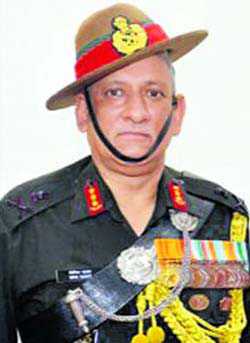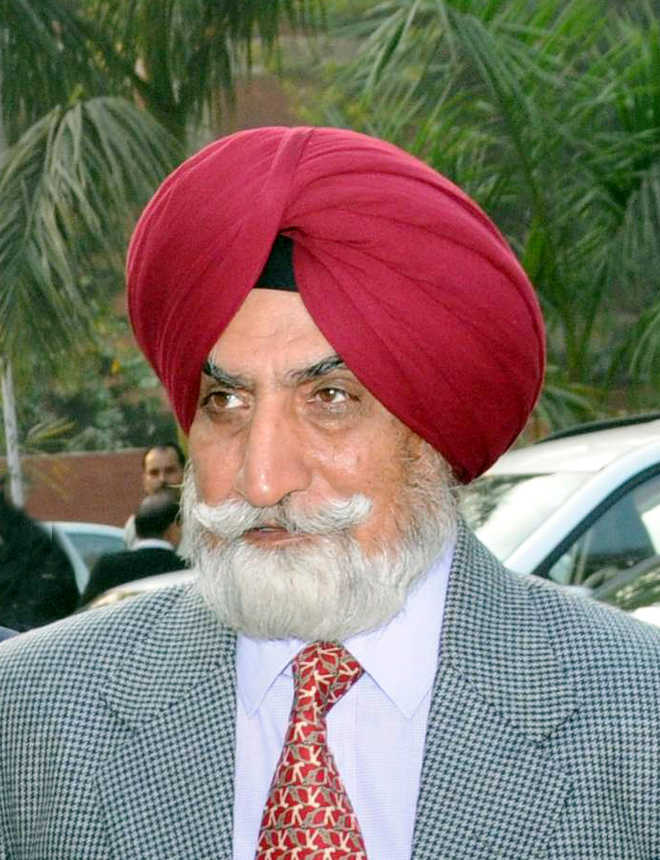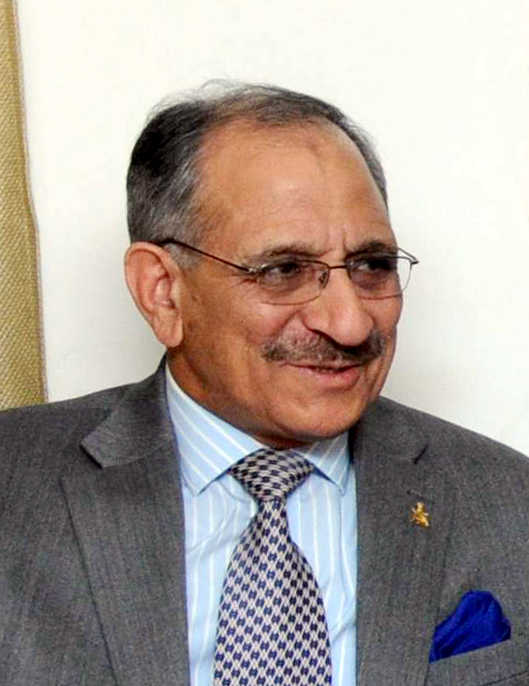The government does not require the permission of 10, Janpath (Congress president Sonia Gandhi’s official residence). MUKHTAR ABBAS NAQVI, BJP leader
NEW DELHI: Lieutenant General Bipin Rawat’s appointment as army chief has become the latest flashpoint between the government and Opposition, days after a political row over the recall of high-value currency washed out Parliament’s winter session.
The Congress said it wasn’t questioning Rawat’s abilities but wanted to know why two senior people were superseded.
“Is it that all these officials who were superseded were not able? Or was it cherry-picking?” Congress leader Manish Tewari asked.
On Sunday, Tewari also pointed out how the NDA administration created controversies over other key appointments, such as that of the chief vigilance commissioner.
Former central board of direct taxes chief KV Chowdary was appointed as CVC after a long delay, triggering criticism from lawyers such as Ram Jethlamani and Prashant Bhushan.
The Congress also cited the “non-appointment” of a fulltime director of the enforcement directorate.
“Right now, there are questions about the CBI director… and they have still not notified the appointment of the Chief Justice of India,” said Tewari.
The Congress had written to Prime Minister Narendra Modi against the appointment of Rakesh Asthana as interim CBI director earlier this month, calling the process “vitiated and manipulated”.
Within hours, the BJP hit back, saying that the government had followed standard norms and that the Congress couldn’t dictate terms. “The government does not require the permission of 10, Janpath (Congress president Sonia Gandhi’s official residence),” Union minister Mukhtar Abbas Naqvi said on Sunday. “I think till now the Congress is not able to understand that they have lost power at the Centre.”
The BJP and the Congress have been locked in a verbal war since the government recalled Rs 1000 and Rs 500 notes last month, a move that the Opposition says has hurt the poor and the farmers.
Controversy over the decision deadlocked the winter session, which saw little legislative business. In promoting Rawat, the claims of Eastern Army commander Lt Gen Praveen Bakshi, the senior-most general, and Southern Army commander Lt Gen PM Hariz, were ignored. But government sources said Rawat – who takes over on December 31 – was found “best suited” to deal with emerging challenges, including a “reorganised and restructured military force in the north, continuing terrorism and proxy war from the west, and the situation in the Northeast”.
Former army chief Shankar Roy Chowdhury also confirmed the government had the “final authority” to pick the army chief.
“I have no patience with what political parties are saying. I appeal to them not to politicise the last reputable institution of India which is world class,” said Roy Chowdhury, the last army chief from the armoured corps. But many opposition parties didn’t seem convinced. “Superseding in appointments always opens the up the avenue for many questions,” said Tathagat Satpathy, a leader of the Biju Janata Dal that is otherwise supportive of the government.
Communist Party of India leader D Raja reminded that the appointments in the army, CVC and other top-level positions had become controversial during the NDA regime. “The government should answer how these appointments have been made,” Raja said.
Slugfest over Gen Rawat
Govt defends appointment of Army Chief as Oppn questions move

Lt Gen Bipin Rawat
Ajay Banerjee
Tribune News Service
New Delhi, December 18
As the Opposition today questioned the Centre’s decision to appoint Vice-Chief of Army Staff Lt Gen Bipin Rawat as the new Army Chief, superseding two senior officers, the BJP said it was “extremely unfortunate” that the Congress “looks to politicise everything”.Editorial: New Army ChiefCongress spokesperson Manish Tewari demanded to know why Eastern Army Commander Lt Gen Praveen Bakshi and Southern Army Command chief Lt Gen PM Hariz were superseded. On the government’s defence that the decision was not unprecedented, he said, “Nothing can be extrapolated out of context to justify a supersession.”(Follow The Tribune on Facebook; and Twitter @thetribunechd)Sources said one of the reasons Lt Gen Rawat had been selected was that he had served along the Line of Control (LoC) with Pakistan and the Line of Actual Control (LAC) with China. “In the current situation, we need a person with experience in the relevant area, that is operational experience,” explained a senior functionary in the MoD.He said Lt Gen Rawat was found the best suited “to deal with emerging challenges, including a reorganised and restructured military force in the North (read China); continuing terrorism and proxy war from the West, and the situation in the North-East.”He said selecting the most eligible Army Commander was the prerogative of the government, “irrespective of the Corps to which the officer originally belonged”. Lt Gen Bakshi is from the Armoured Corps.It was 30 years ago, when winter was setting over the Himalayan heights in Arunachal Pradesh, when the newly appointed Army Chief ‘cut his teeth’ as a military officer.The Army, then led by General K Sundarji, was tasked to stall the ingress of the People’s Liberation Army (PLA) near Zimithang, north-west of Tawang. General Sundarji launched ‘Operation Falcon’ and moved a brigade (some 3,000 men) north of Tawang, using IAF helicopters. A nine-month standoff ensued, militarily referred to as ‘Sumdrong Chu’. Troops were deployed all along McMahon Line. During this period, the Army launched a massive air-land exercise called ‘Chequerboard’ (October 1986 to March 1987) that entailed moving troops to almost all locations in Arunachal. The north-eastern state was granted full statehood in December 1986.Lt Gen Rawat, with just eight-year service then, took part in the event during which India stacked up 50,000 troops against PLA’s 30,000. China agreed to end the ‘military confrontation’ in November 1987.A retired Commander, meanwhile, questioned how Lt Gen Bakshi, commanding the vital Eastern Command, was found lacking in experience. He also commanded 9 Corps, based at Yol (Himachal), tasked with China and Pakistan. (With PTI inputs)
ARMY CHIEF ROW
‘Govt has right, but seniority matters’
Veterans say move may affect functional environment, ethos of armed forces


Lt Gen TK Sapru, former goc-in-c, Western command
Vijay Mohan
Tribune News Service
Chandigarh, December 18
The appointment of Vice Chief of Army Staff Lt Gen Bipin Rawat as the next Army Chief, superseding two other officers, has kicked up an intense debate on the government bypassing the long-standing convention of appointing the senior-most officer as the service chief.While there is no legal lacuna in the government’s move as the selection is ought to be done on a seniority-cum-merit basis, there is also a feeling in some quarters that the existing practices should not have been disturbed as it may have ramifications on the functional environment and ethos of the armed forces.(Follow The Tribune on Facebook; and Twitter @thetribunechd)The move may also affect the “line of succession” that defines the career path of senior officers based upon the arm to which they belong and their age and the ratio of officers from different arms being placed in particular appointments. Some officers also feel that the situation is unlikely to have a lasting impact on the army as the force is professional and mature enough to absorb unexpected developments.“The Army Chief-designate is an excellent officer, but I am not too happy with the move of the government as it may result in subjectivity in future and the possibility of the system being manipulated. There is no established system to compare officers at the level of army commanders and it is very difficult to decide who is better among his peers,” said Lt Gen TK Sapru, former GOC-in-C, Western Command.He said: “We were following a system of selecting the senior-most commander who was objective and should have carried on with it unless something wrong had been brought out.”Lt Gen AS Sekhon, former Director General Military Operations and 15 Corps Commander, said: “The concept of seniority should have been retained otherwise it may lead to politicisation of the army and officers at the top may line up to please the political leadership.”He said: “The principle of seniority has been accepted by all branches and the army’s hierarchy was mentally prepared for Lt Gen Bakshi to take over. The government’s move will create a huge dent in the functioning of the armed forces and create friction between different arms and services with the possibility of officers from different arms attempting to cut each other at the lower levels to gain edge.”Lt Gen Praveen Bakshi, an armoured corps officer, and Lt Gen PM Hariz, among the few Muslim officers to reach the top, became army commanders in August 2015, while Lt Gen Rawat became an army commander in January 2016. Lt Gen BS Negi, whose name also cropped up in the debate, is from the same course as Lt Gen Rawat and became an army commander in January 2016, but is junior to Lt Gen Rawat by virtue of his service number.“Legally, it is well within the government’s powers to choose a service chief from amongst the eligible officers. One aspect of service jurisprudence for selection to a post that is mandated for all central government departments is that there should be a ratio of at least 1:3,” Col SK Aggarwal, former officer of the Judge Advocate General’s Branch said.“Besides the career profile of an individual, several other factors such as suitability in the prevailing geostrategic situation, age commensurate with full tenure and other inputs from the defence and home ministries are considered,” he said.“Many officers get superseded at all levels for varying reasons in their course of service and this happens in other government departments also. So why make a noise with a lieutenant general getting superseded,” said Col Bipin Pathak, a former Intelligence officer, adding: “Ïnter se merit should always be the consideration for promotion and since it is the elected government that is answerable to the people, it has the right to chose whom they consider best for the post.


